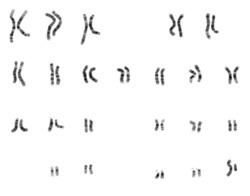kidsneedscience:The word gene was first used in English in 1911, derived from the German word Gen, c
kidsneedscience:The word gene was first used in English in 1911, derived from the German word Gen, created in 1905 by Danish scientist Wilhelm Ludvig Johannsen (1857-1927) from the Ancient Greek word γενεα (genea) meaning generation or race (of people). The word genome was first used in 1920 by professor of botany Hans Winkler of the University of Hamburg. He patterned the word on the word chromosome, a combination of the Ancient Greek words χρομος (chromos meaning color) and σομος (somos meaning body). Unfortunately he followed the example set by the recently coined words rhizome and biome, both of which took only part of the root suffix for -somos and rendered it -omos. The genome is defined as the entirety or collection of genetic material needed to form an individual. In addition to the word genome, the word gene now forms a part of many more English words: genetic, etc.Scientists working at the European Bioinformatics Institute recently used the structure of DNA to store data-DNA after all is nothing more than the storage device for all that genetic material. Using the building blocks of DNA, Ewan Birney and Nick Goldman (read about their story by clicking here) converted Shakespeare’s Sonnet 18 and sent the result to a gene sequencing lab. A few weeks later they received a test tube with the newly created DNA which when they sequenced gave back their encoded Sonnet. The sonnet they chose was particularly appropriate: Shall I compare thee to a summer’s day? Thou art more lovely and more temperate:Rough winds do shake the darling buds of May,And summer’s lease hath all too short a date: Sometime too hot the eye of heaven shines,And often is his gold complexion dimm’d; And every fair from fair sometime declines,By chance or nature’s changing course untrimm’d;But thy eternal summer shall not fadeNor lose possession of that fair thou owest;Nor shall Death brag thou wander’st in his shade,When in eternal lines to time thou growest: So long as men can breathe or eyes can see,So long lives this and this gives life to thee.While Shakespeare had three children, they were not terribly prolific, and the gene pool that issued from Shakespeare ended in 1670 with the death of his last grandchild. Image of the human chromosome (and therefore genome) courtesy National Human Genome Research Institute, released to the public domain.Image of William Shakespeare also in the public domain. -- source link
Tumblr Blog : kidsneedscience.tumblr.com

